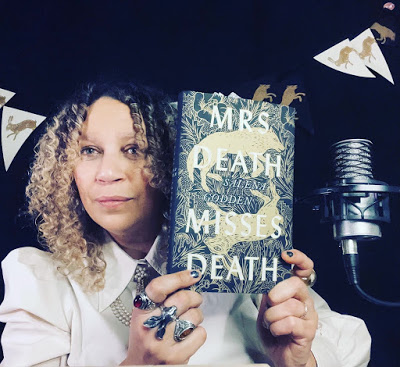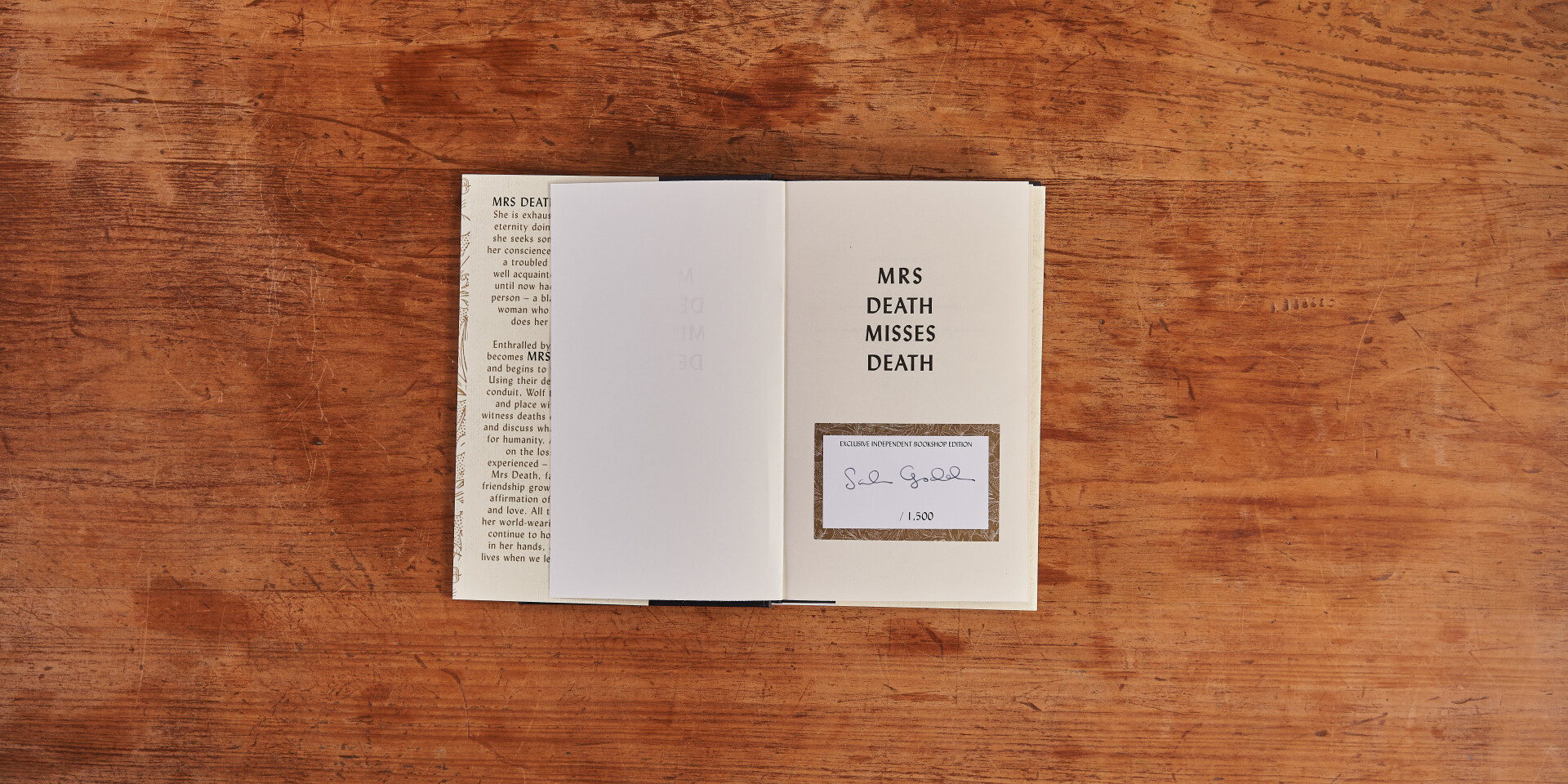
You may have already seen over the last few months that the LoveReading team adore Salena Godden’s novel Mrs Death Misses Death. We chose it as a Debut of the Month, Liz Robinson Pick of the Month and it starred as our February Book Club recommendation. While Salena Godden is a published poet and a Fellow of the Royal Society of Literature, this is her debut novel. This stunning novel uses a variety of writing styles to enable the reader to explore life, love, and hope as well as death. While not an entirely comfortable reading experience, as there are some difficult paths to explore, this is a powerful, and truly beautiful read, so when Salena agreed to be our Debut Author of the Month we were thrilled.
Here she answers our questions about writing, Mrs Death, and the publication process, thank you Salena.
Did performing or writing come first for you, and why are words so important to you?
I am a writer before I am a performer. The writing came first. I devoured books, which then inspired me to create stories and write poems on my own in my bedroom. I was always trying to make sense of the world with words. So many of my projects have been produced DIY so the performance aspect was a way to sell my self published work, zines and albums too. Also the travelling and gigging was a way to share my writing and connect and collaborate with other writers and artists and begin to have fun with it, there is a lot of playfulness in my work on stage.
I can remember being a little girl and loving being alone with books, making my own worlds, writing stories. As a little girl I liked to write horror and ghost stories. I'd make radio plays on my tape recorder and do all the voices and sound effects. I still feel like that little girl, especially in lockdown. This is the longest time I haven’t been on the road; during lockdown I feel like I have regressed to the introverted kid I was, recording radio and writing stories alone in my room.
Tell us about your first written work and performance.
My first time on stage to perform as a poet was upstairs at The Paradise in West London. I was coaxed onto the stage by the legendary Scottish poet Jock Scot. He became a great friend and mentor. After that I was invited to do more shows and my stage moniker became Salena Saliva. Many of my gigs in the nineties were in smoky rooms above pubs with sticky carpets or in music venues as a support or opening act for ska, punk and grunge bands or in raves and clubs.
I began to perform visceral feminist poetry sets to beats and drum and bass and ska-influenced tracks, which I wrote with my band called SaltPeter with Peter Coyte. In the early days I wrote poetry to drink to and rebel to, poetry to dance to, poetry that was very much part of nineties rave and club culture, poetry that was provocative and rebellious. Looking back, I see that twenty-year-old young poet I once was and thank her for that fire and fearlessness and for never giving up.

What was your favourite book from childhood and do you still have it?
My favourite book from childhood would have probably been Brer Rabbit or Grimms fairytales, I loved story books like that. I also remember when I went to the library I would take out books that were big and heavy with titles a bit like “100 stories for vampires” or “100 ghost stories” and I would devour these massive compendiums of stories.
Later as a young teenager it was all about Alice Walker The Color Purple, Laurie Lee Cider With Rosie, Maya Angelou I know Why The Caged Bird Sings, Dylan Thomas Under Milk Wood and I also remember reading books by Judy Blume.
Tell us about your writing process.
I am an early morning writer. I like to watch the day break and I am often up at 4am to begin work. There in the first light I am still half in dream world and I like to capture some of that colour and feeling in my work. I am happiest if I have done 4 or 5 hours of my own thing before the world wakes up and I have to attend to other jobs and real life tasks. I believe a good day is a day when there has been time for two breakfasts.
Many chapters in this book were composed on the lips – written whilst walking and talking and recording monologues into my phone and then typing them up at home later. I haven’t used the technique before but that was how the character Mrs Death developed, she was created aurally and vocally.
Is there a moment in time or particular book that made you think, I have to write a novel one day?
Like so many of my friends and fellow writers I have always written. I have boxes of work in progress and first drafts of novels under my bed. I don’t think there was a time in my life I wasn’t thinking about writing or thinking that I must write a novel or working on something secret, ideas for plays and scripts too. I discovered early on that it is easy to have really brilliant ideas, but not so easy to finish things, to see work developed and published. So, I feel so very lucky to see Mrs Death Misses Death in print and in bookshops now and I don't take any of it for granted.
During the writing of Mrs Death Misses Death I remember I re-read Sylivia Plath's The Bell Jar and Jean Rhys Good Morning Midnight - These books were really inspiring to me during the process.

Mrs Death is completely wonderful, for how long did she keep you company before stepping onto the page?
I think I have been writing this book for a very long time. I feel like Wolf has been with me for all my life, the spirit of my younger self and of so many of my friends, the family of young poets, authors and artists I have mentored and hold so dear. The desk came to me as a flamboyant character leaping off the page to me almost a decade ago. Mrs Death first visited me one Christmas when I was walking down Brick Lane and the first time she spoke to me she said: I know a lot of dead people now...
Tell us about your road to publishing Mrs Death Misses Death, because you had a slightly different experience to most authors with the Radio 4 documentary following your progress over twelve months.
Mrs Death Misses Death has been an unusual path. I worked on it in between tours and gigs, it was informed by protests and marches. It was written whilst I was producing and releasing the spoken word album LIVEwire with Nymphs and Thugs and doing shows to support the publications of The Good Immigrant and Pessimism is for Lightweights with Rough Trade Books. This novel has been bubbling away in the background under all of that activity.
It began life as my secret project, as a story I wanted to tell myself and I wasn’t sure it would ever be published, I mean if I dare find the courage to let anyone else read it. During the writing of the book I kept audio diaries, as I said earlier, much of the work was composed on the lips. I also regularly went on the train down to Whitstable to record some of the work set to music and write songs with my friend the composer Peter Coyte. Lots of this early material went into the Radio 4 documentary.
Looking back this was a terrifying and brave choice I made - to share unpublished ideas and rough drafts and demo’s of songs on national BBC Radio - but it motivated me in so many ways and gave me confidence to not only complete the book to the best of my ability, but have me courage to seek an agent and a publisher. What a roller coaster ride this book has been! Thank you OWN IT!, Canongate and Green Door Pictures too.

What is the one thing that has stood out for you about the publication process?
The one thing that has stuck out in the publication process? It was learning to let it go. I spent so long on this alone it felt so strange to let people read it. My mother always told me to go where the love is. I reckon I can go miles with someone believing in me. Right now I feel supported and cushioned. I am where the love is and it is a good place, I am new here and I like it.
When did you first realise that the Mrs Death was striking a chord with readers?
Honestly it all feels very surreal for me and especially in lockdown because everything is in my phone and online. If these were 'normal times’ I know I would be sharing this work and touring and gigging and travelling and having amazing conversations and adventures and hugging lots of strangers.
For me the best thing has been the personal: the most powerful responses have been people sharing their own last page, where readers are invited by The Rabbit to remember people they’ve lost. I have received lots of private messages, emails from people who want to show me their last word, their last pages, how they have made collages with poems and photos of lost loved ones in their copies of the book. I am feeling the connection with this, with the people who have joined in the ritual of the last page – it has felt beautiful and raw and real to me even though I cannot see people in person or hug anyone as I normally would.

Finally, what is next for you?
That is so top secret. So for now I’ll just say I am biding my time, I keep on keeping on. I’m writing most mornings, watching the sunrise. I'm keeping my friends and family safe, staying home, baking cakes and making soups and curries, listening to audio books, reading books, making podcasts and radio, loving the light and warmth of this spring sunshine. I feel like I am waiting to emerge with you all in a kaleidoscope of brave butterflies from our shared cocooned hibernation.




Comments (0)
Leave A Reply
You must be logged in to post a comment.